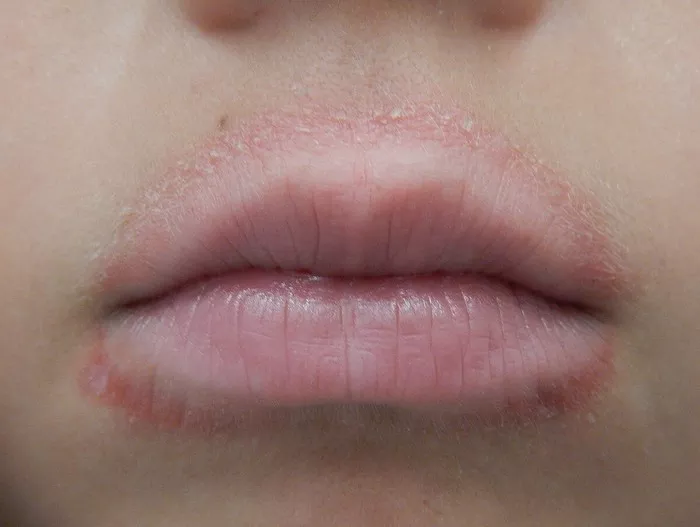Eczema, a common skin condition characterized by inflammation and irritation, can affect various parts of the body, including the lips. Eczema on the lips, also known as lip dermatitis or eczematous cheilitis, can be particularly uncomfortable and challenging to manage due to the delicate nature of the skin in this area. In this comprehensive guide, we will delve into the types, symptoms, triggers, and treatment options for eczema on the lips to provide a better understanding and aid in effective management.
Types of Eczema on the Lips:
Eczema on the lips can manifest in different forms, each with its unique characteristics:
1. Allergic Contact Dermatitis:
This type of eczema on the lips occurs when the skin comes into contact with an allergen, triggering an immune response. Common allergens include certain lip balms, lipsticks, toothpaste ingredients (such as sodium lauryl sulfate), and food items like citrus fruits or spices.
2. Atopic Dermatitis:
Atopic dermatitis, often referred to as eczema, is a chronic inflammatory skin condition characterized by dry, itchy patches. While it commonly affects areas like the elbows and knees, it can also affect the lips, leading to redness, scaling, and cracking.
3. Seborrheic Dermatitis:
Seborrheic dermatitis is a form of eczema that primarily affects areas rich in sebaceous glands, such as the scalp, face, and ears. It can also affect the lips, causing redness, flaking, and itching, often accompanied by yellowish or greasy scales.
Symptoms of Eczema on the Lips:
Eczema on the lips presents with various symptoms, which may include:
Dryness and chapping
Redness and inflammation
Itching or burning sensation
Swelling or thickening of the lips
Cracking or fissuring
Formation of blisters or sores
Oozing or crusting in severe cases
These symptoms can vary in intensity and may worsen with certain triggers or environmental factors.
Triggers of Eczema on the Lips:
Identifying and avoiding triggers are crucial steps in managing eczema on the lips. Common triggers include:
1. Allergens:
Allergic reactions to lip care products, cosmetics, toothpaste, or certain foods can exacerbate eczema on the lips.
2. Environmental Factors:
Exposure to extreme temperatures, dry air, wind, or sunlight can contribute to lip dryness and irritation, worsening eczema symptoms.
3. Irritants:
Harsh chemicals present in lip balms, lipsticks, or oral care products can irritate the sensitive skin of the lips, triggering inflammation and eczema flare-ups.
4. Stress:
Stress is known to exacerbate various skin conditions, including eczema. High levels of stress can weaken the immune system and increase inflammation, leading to flare-ups of eczema on the lips.
5. Poor Lip Care Habits:
Habitual licking of the lips, excessive scrubbing, or using lip products with irritating ingredients can damage the skin barrier and worsen eczema symptoms.
Treatment Options for Eczema on the Lips:
Effective management of eczema on the lips involves a combination of preventive measures, lifestyle modifications, and targeted treatments. Here are some strategies for managing eczema on the lips:
1. Moisturize Regularly:
Keeping the lips well-hydrated is essential for preventing dryness and minimizing eczema flare-ups. Use fragrance-free, hypoallergenic lip balms or ointments containing moisturizing ingredients like petrolatum, beeswax, or shea butter.
2. Avoid Triggering Substances:
Identify and avoid allergens, irritants, and other triggers that exacerbate eczema on the lips. Read product labels carefully and opt for gentle, fragrance-free lip care products.
3. Protect from Environmental Factors:
Shield the lips from harsh weather conditions by wearing a scarf or using a lip balm with added sun protection (SPF). Humidifiers can also help maintain optimal moisture levels indoors, especially during the winter months.
4. Practice Stress Management:
Incorporate stress-relieving techniques such as meditation, deep breathing exercises, yoga, or hobbies into your daily routine to minimize stress and reduce the risk of eczema flare-ups.
5. Topical Treatments:
In cases of mild to moderate eczema on the lips, over-the-counter hydrocortisone creams or ointments may provide relief from inflammation and itching. However, prolonged use of topical steroids should be avoided due to the risk of skin thinning and other side effects.
6. Prescription Medications:
For severe or persistent cases of eczema on the lips, a dermatologist may prescribe stronger topical corticosteroids, calcineurin inhibitors, or immunomodulators to control inflammation and restore skin barrier function.
7. Avoid Lip Licking:
Resist the urge to lick or bite the lips, as saliva can further irritate the skin and exacerbate eczema symptoms. Instead, use a lip balm to moisturize and protect the lips throughout the day.
8. Maintain Good Oral Hygiene:
Choose toothpaste and oral care products that are free of potential irritants or allergens. Brush and floss regularly to prevent bacterial buildup around the lips and mouth.
9. Consult a Dermatologist:
If eczema on the lips persists despite self-care measures or worsens over time, seek advice from a dermatologist. A dermatologist can provide a personalized treatment plan tailored to your specific needs and may recommend additional tests or procedures if necessary.
Conclusion
In conclusion, eczema on the lips can be a challenging condition to manage, but with proper understanding, preventive measures, and targeted treatments, it is possible to alleviate symptoms and improve quality of life. By identifying triggers, practicing good lip care habits, and seeking professional guidance when needed, individuals with eczema on the lips can effectively manage their condition and enjoy healthier, more comfortable lips.
[inline_related_posts title=”You Might Be Interested In” title_align=”left” style=”list” number=”6″ align=”none” ids=”1289,1280,1273″ by=”categories” orderby=”rand” order=”DESC” hide_thumb=”no” thumb_right=”no” views=”no” date=”yes” grid_columns=”2″ post_type=”” tax=””]
























